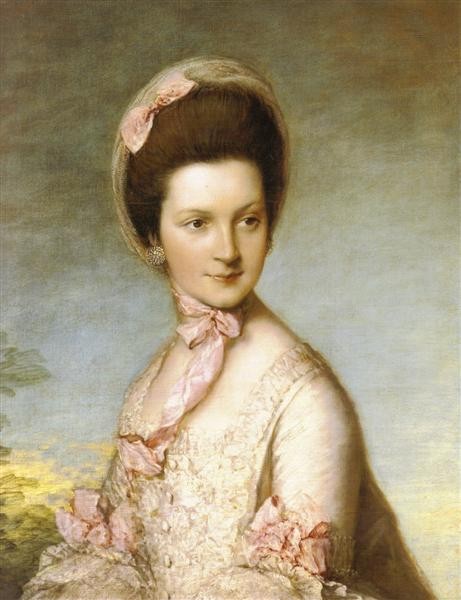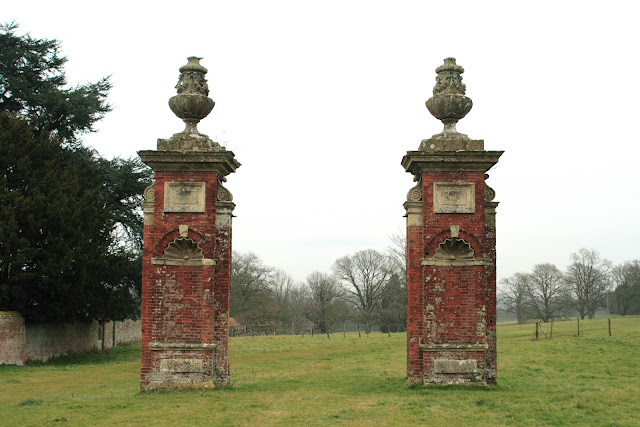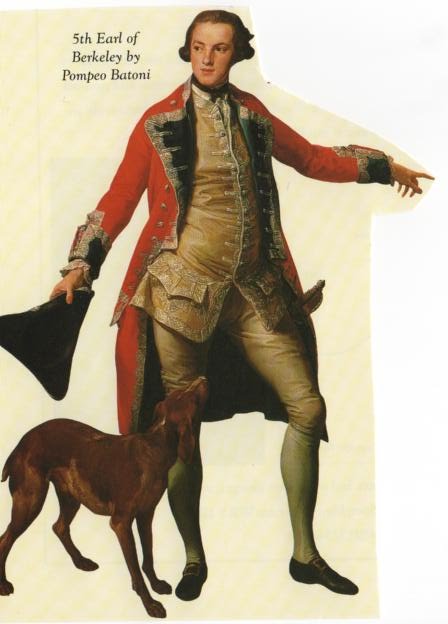Further Adventures of Henrietta, Lady Grosvenor
Henrietta Vernon, Lady Grosvenor, by Thomas Gainsborough
When a Georgian woman got divorced, she was supposed to disappear into a twilight of disgrace and social disapproval. At the end of Mansfield Park, this happens to Maria Bertram, who elopes with Henry Crawford, is divorced by her husband Mr Rushworth, and ends up banished from England to live somewhere abroad "remote and private".
But did she really have such a terrible fate? I sometimes imagine that Maria Rushworth had a whale of a time in Paris or Brussels, far away from Mansfield Park. The life of Henrietta, Lady Grosvenor, suggests that divorce was not always such a disaster. There was in fact a flourishing Alternative Society in Georgian England, within which such women lived with impunity and they were very much in the public eye.
Miss Caroline Vernon c.1780 by François-Xavier Vispré from National Trust
collection, Attingham Park, Shropshire, the home of her sister Anna.
There were four Vernon sisters altogether and two of them, Caroline and Anna, were Elizabeth Craven's girlhood friends before she married Lord Craven. All the Vernon sisters were admired when they came out and expected to marry well. Anna married Noel Hill, Esq. MP for Shrewsbury, who was created in 1784 Lord Berwick of Attingham. Caroline became a Lady-in-Waiting to Queen Charlotte. Their remaining sister, Lucy, suffered from a mysterious illness and died in 1783.
Henrietta's separation in 1771 from her immensely rich husband, Lord Grosvenor, who owned Belgravia in the West End of London (hence the name Grosvenor Square) caused more than the usual amount of lurid scandal as it was on grounds of her adultery with the Duke of Cumberland, a brother of King George III. The inclusion of royalty makes any scandal hit the headlines. The duke was forced to pay £10,000 damages to the indignant husband, despite the evidence brought of Grosvenor frequenting all the lowest brothels in London.
When Horace Walpole described Henrietta as "A vain young woman, of a good person, moderate beauty, and no understanding," he under-rated her. She was clever enough to hunt down dozens of her husband's whores and mistresses and get them to testify against him, with the result that he got only a separation, not a divorce with the right to re-marry. The way that she fought her corner in this legal battle, finding female allies regardless of their class or background, and her refusal to accept a sexual double standard, entitle her to be called a feminist.
Anna Vernon, Lady Berwick (1744-1797) and her son Thomas
by William Hoare of Bath, RA
The Duke of Cumberland soon lost interest in Henrietta and could never have married her anyway. However for women who had beauty, nerve, charm and assurance, divorce or separation could be the best thing that ever happened to them. With survival instinct and a bit of luck, such a woman could really find she had fallen on her feet. She need not be heart-broken that the prim and prudish, mindful of their own reputations, turned a cold shoulder to her, or that she was never received at Queen Charlotte's stuffy Court receptions again. Henrietta got a comfortable settlement of £1,200 per year - more than many genteel families lived on - and had far more freedom than when she was the wife of Lord Grosvenor. It's true she could rarely if ever see her son Robert, but she spent the next ten years in Paris and London, mixing in the sort of circles where nobody worried about a woman's lost reputation.

Penelope, Lady Ligonier, by Gainsborough
Henrietta found new friends, among other transgressive women. Among them were Penelope, Lady
Ligonier, a divorcee who fled to Paris in 1771, with her lover
Count Alfieri (and came back without him); and Lady Worsley, whose divorce had been one of the ugliest of its kind. All of them belonged to what was called the New Female Coterie. This club held its meetings at the house of a Mrs Prenderghast, who kept a high-class brothel. Magazines liked to satirize the Coterie, and one printed a salacious mock-report of such a meeting, where the members, who include Lady Grosvenor, Lady Worsley, Lady Corke and Lady Ligonier, are talking scandal about a certain "Lady Craveing" alias "Lady Teapot" meaning Elizabeth Craven. (2)
In London, Henrietta was seen at balls held at public venues where the Prince of Wales attended with his friends. In Paris she was known as one of the beauties sought after by the Duc de Chartres and the Comte d'Artois, wealthy aristocrats with royal blood, who hosted lavish dinners and receptions. They swopped mistresses as fast as the gossip columns could keep up with reporting it and they favoured English beauties. Divorcees such as Grace Elliot, actresses such as Mary Robinson and courtesans like Mrs Elizabeth Armistead were on intimate terms with the most powerful men. They were still the leaders of fashion, and turned heads when they drove in open carriages with their latest admirer or lover.
The Opera House in the Haymarket, rebuilt in 1783.
There were some people who even suggested that Lady
Grosvenor took payment from her lovers. In 1778 Mrs Thrale wrote, "Lady
Grosvenor is very avaricious, says somebody. "Odd, says Mrs Cotton, women
of that Disposition are seldom covetous...I see many of them care no more for
Money than the Pope." "Why the Pope is somewhat a bad example,
replies Seward, for he grants Indulgencies for Money, you know, and so does
Lady Grosvenor." This was of course malicious gossip.(3)
By 1783 Henrietta had formed an attachment to a Whig MP called George Porter. He was the son of Sir James Porter, ambassador to Constantinople, where George had been born in 1760, and he was fifteen years younger than Henrietta. He was one of the members for Stockbridge in Hampshire and was re-elected to the seat about a dozen times. In 1783 they were sharing ownership of a box at the new Haymarket Opera House, along with a certain Miss Ellis and a Mr Wynch. So they were regularly seen together in public.(4)
Henrietta was never cold-shouldered by her own brothers and sisters. She kept in touch with all of them. In August 1784, when the Duc de Chartres came to England and attended a race-meeting at the newly-opened fashionable race-course at Brighthelmstone in the company of the Prince of Wales, Miss Caroline Vernon was one of the spectators and so was Lady Grosvenor. Elizabeth Craven was rumoured to be coming, to meet her old friends, but did not turn up.(5)
The race-course at Brighthelmstone, Brighton, in 1783.
Henrietta's brother Henry Vernon was her staunch ally in her divorce case, and stood by her loyally. In 1787, Anna Seward, the poet, who lived in the Midlands close to Hilton Hall, the Vernon family home, described him as a remarkable person:
We have in this neighbourhood an extraordinary character, Mr Vernon, Lady Berwick's brother; whom, in early life, the form of an Adonis, an ardour for licentious pleasures, and for increasing the means of obtaining them, made a fine man about town, a knowing man on the turf, and a deep staker at White's, till he was about thirty. Then, turning suddenly from these soul-less pursuits, he threw his energies into far different channels, and roamed, in a ten year's tour, with enthusiastic curiosity, not only " the Celtic and Iberian fields," but almost every scene upon the globe which has been dignified by martial prowess, or has obtained poetic celebrity. He has seen, in tolerable preservation, a great part of the Temple of Ceres at Thebes; has stood upon Mount Calvary, Olympus, and the Aonian Hills; and has drank of the now nearly exhausted waters of the Simois and Scamander; has fought, since England sheathed the sword, the Indians for America, and the Turks for the Empress. He was some time at Gibraltar with General Elliot, and obtained the friendship of that illustrious Being. (6)
Miss Seward did not know the reason for Henry Vernon's ten-year absence from England. Elizabeth Craven knew the secret very well, and so probably did Lady Grosvenor.
Miss Seward did not know the reason for Henry Vernon's ten-year absence from England. Elizabeth Craven knew the secret very well, and so probably did Lady Grosvenor.
Hilton Hall, the Vernon home in Staffordshire, where Henrietta
was born. The third storey was added later.
Henrietta could not re-marry until her first husband died, but was linked to and possibly living with George Porter from 1783 onwards. He certainly acted as a husband to her, looking after her investments. In 1799 he went to court with a Mr Martindale, to reclaim £2,000 invested on behalf of Lady Grosvenor and her sister Lady Berwick. The court was told that Mr Porter himself owed Martindale a large sum, but that this was irrelevant to his dealings on behalf of the ladies, for whom he acted as a trustee. (7) Lady Berwick was by this time dead, having died at Manfredonia in Italy, where she went for her health in 1797.
During the Napoleonic Wars, Mr Porter enlisted as an infantry officer and rose to the rank of Lieutenant-General. He commanded the 103rd Regiment of Foot. Doing so was a risky but a lucrative occupation for those holding his rank. Henrietta's first husband died in August 1802. A fortnight later she married George Porter.
General Porter's mother had been Clarissa Catherine de Hochepied, daughter of the Baron de Hochepied, a Hungarian nobleman who was acting as Dutch ambassador to Constantinople when she married the Englishman, Sir James. Such Hungarian titles could descend through the female line, so George applied for, and got, recognition of his rank as Baron de Hochepied. This saved Henrietta from the slight come-down of changing the name of Lady Grosvenor to that of Mrs Porter. She could be very satisfied to be introduced in drawing-rooms as Baroness de Hochepied, the wife of a distinguished, fairly wealthy man considerably younger than herself. It was a triumph.
Henrietta's son Robert became Earl Grosvenor, and his descendants, the Dukes of Westminster, still own Belgravia, including Grosvenor Square in the West End of London.
She died at Ealing, in 1828, aged not 92, as is sometimes stated, but 82, which was still a very advanced age for the time.
Elizabeth Craven wrote in 1799, in the Author's Apology to her novel The Witch and the Maid of Honour, that she was "extremely partial to unmarried ladies," and knew "several at this time, who are the most amiable women in the world." What did she mean by that? The obvious meaning is that she had friends who were single women, who had never married. But the other possible meaning of "unmarried ladies" is those who were separated or divorced from their husbands. The word "divorcée" was not in existence at this time and there was no appropriate term. So "un-married" could have been used as a code word for divorced, and such a use would be quite typical of Craven's artful and layered used of language. She had frequently been classified among those fallen women, demi-reps with tarnished reputations, and she was fighting back.
To find out more about Elizabeth Craven, her writings and the people she knew, read

https://vernonpress.com/book/334
Now available on Ebay
https://www.ebay.co.uk/itm/Elizabeth-Craven-Writer-Feminist-and-European-hardback-NEW-Vernon-Press-2017/202540437722?hash=item2f2859d0da:g:bccAAOSw8OFcF3-k:rk:1:pf:0
(1) Peerage of England: Containing a Genealogical and Historical Account of All ... vol. III
By Arthur Collins W. Innys, 1756, page 321.
(2) Rambler's Magazine, July 1783, p.273.
(3) Dr Campbell's Diary of a Visit to England in 1775, By Thomas Campbell page 123.
(4) The European Magazine, and London Review - Volume 3 -1783 . Page 115.
(5) Rambler's Magazine, August 1784, p.359.
(6) Letters of Anna Seward: written between the years 1784 and 1807 ...By Anna Seward, Archibald Constable, Constable, 1811, p.320.
(7) Sporting Magazine - Volume 13 - 1799 - p.167.








Comments
Post a Comment